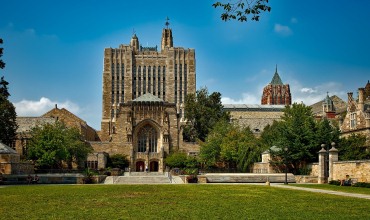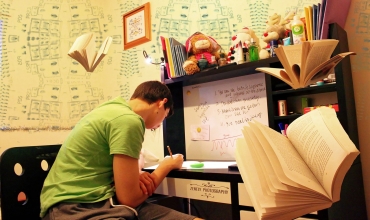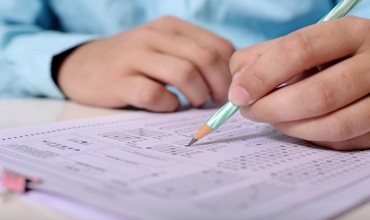Англомовні країни. Велика Британія
8-й клас
Мета практична: повторити матеріал, вивчений з теми “Великобританія”,
тренувати учнів у вживанні в мовленні тематичної лексики, удосконалювати
навички монологічного та діалогічного мовлення на цій основі, розвивати
навички аудіювання, удосконалювати навички читання та перекладу
тематичних текстів
Мета виховна: виховувати повагу до культури, історії країни, мова якої
вивчається; заохочувати учнів до вивчення англійської мови, культури
Великої Британії;
Мета розвиваюча: розвивати пам’ять, логічне мислення в процесі виконання
навчальних завдань.
Обладнання: карта країни, емблема, символи Великої Британії, види
Лондона, таблиця „Визначні британці”, картки з реченнями для перекладу,
магнітофон, аудіокасета з записами аудіювання „В. Кекстон”, піснею „Моя
любов”(слова Р. Бернса), текст „Словники”.
Хід уроку
О. Dear children!
Respected quests! Our today’s lesson is devoted to Great Britain. Its
our final lesson on the topic. We are going to review the material we
have already learnt and try to learn something new.
Hope you’ll enjoy every minute of the lesson.
Let’s start.
A. Our first step is warming-up
Please answer the questions. Be quick and exact. You’ll get one fish for
each right answer. My assistant will help me.
Questions
1. Where is the UK situated?
2. What separates it from Europe?
3. How many seas is it washed by?
4. What part of the UK are flat (mountainous)?
5. Where is Beg Ban?
6. What’s the longest river of the country?
7. How many people live in the UK?
8. What city was founded by Celts got its name from Romans?
9. What minerals is it rich in?
10. What branches of industry are developed in the country?
11. How do British call the flag? What does it symbolize?
12. Why the motto in the emblem of the UK is in French?
13. Which words of the English language are difficult for spelling?
14. What is Elizabeth the second?
15. Who rule the county?
16. What does the parliament do?
17. What’s the currency unit of the country?
18. What’s the oldest building in London?
19. What do crows mean for London Tower?
20. What will you take to the UK if you go there?
21. What’s the biggest part of the country?
22. What is Lock ness famous for?
23. Why did Scottish people make thistle their emblem?
Results. Praise.
B. The first thing we learn about every country is the geographical
position. Its our next step.
Who would like to speak on the topic?
B1. The geographical position of the country (location, parts,
mountains, lakes, rivers, climate) – pupil speaks on the topic.
Minerals form the base for the development of industry. Climatic
conductions influence upon agriculture and farming.
Our next expert will tell us about mineral resources, industry,
agriculture and goods country exports.
B2. Minerals, industry, agriculture, export – pupils speaks on the
topic.
The UK is the country with old tradition. People honour their national
symbols.
B3. Symbols of the UK (Flag, plants, UNI0N Jack, the emblem of the
country, valute) – pupil speaks on the topic.
(Addition. Teacher shows an illustration to L. Carrol’s book “Alice in
Wonderland” and recites his description of the emblem)
Лев и один Единорог
Дрались из-за короны.
Сломав Единорогу рог,
Лев отлупил его – как мог
Им дали яблочный пирог,
Лапшу и макароны.
Раздался шум из-за дверей,
Забарабанил кто-то.
И перетрусивших зверей
Погнали за ворота.
C. Hope you know enough about the country to plan your tour and to start
packing. Let’s dream. Please use if sentences. Remember that its
impossible to use Future Indefinite Twice in the sentence.
If I ….. I shall …..
Each pupil translates 2 sentences:
1. Якщо я поїду в Велику Британію, я візьму камеру з собою.
2. Якщо я поїду до цієї країни, я скуштую традиційний пудинг.
3. Якщо я відвідаю Об’єднане Королівство, я куплю кільт для мого тата.
4. Якщо я поїду до Лондона, я відвідаю Лондонський зоопарк.
5. Якщо мій друг поїде в Лондон, він сфотографує собор святого Павла.
6. Якщо він поїде до Великої Британії, він купить ролс-ройс для мами.
7. Якщо я поїду до Великої Британії, я візьму з собою український
прапор.
8. Якщо я поїду в Шотландію, я відвідаю музей Бернса.
9. Якщо я буду в Лондоні, я піду до Національної галереї.
10. Якщо я буду в столиці, я відвідаю матч Лондонського „Арсеналу”.
11. Якщо я буду в Лондоні, я відвідаю Музей мадам Тюссо.
12. Якщо я більш дізнаюсь про Велику Британію, я відвідаю країну ще раз.
13. Якщо я добре знатиму англійську, я знайду багато друзів в різних
країнах.
14. Якщо я матиму багато друзів, я буду щасливим.
D. Now we are in London, the capital of the UK.
You have a lucky chance to join a group of tourists and enjoy an
excursion around the city.
Our guide will tell us about London. (Pupil tells the class about the
capital).
D1. (Other pupils ask him question about London.)
D2. Dialogues.
1. The Tower of London:
A: What is the oldest building in London?
B: It is the Tower.
A: What is the Tower?
B: It was a royal residence and a prison. Now it is a famous museum.
A: What can we see there?
B: You can see royal treasures in the Tower.
A: English people have a legend about it, don’t they?
B: Oh, yes. They keep crows there. They believe that Great Britain will
exist as long as the crows live in the Tower.
A: Thanks a lot.
B: The pleasure was mine.
2. The Museum of Madam Tussaud:
C: What is the most interesting museum in London?
D: It is the Museum of Madam Tussaud.
C: How did it get it’s name?
D: It is called after the person who founded it.
C: Was she English?
D: No. She came from France.
C: What can we see in the museum?
D: You can see wax sculptures of famous sportsmen, pop-stars, criminals
and politicians.
C: Thank you.
D: The pleasure was mine.
E. In the Museum of Madam Tussaud you can see wax sculptures of famous
people of the past (kings, queens, pirates, generals, admirals,
scientists) and sculpture of those who live now (Presidents, ministers,
film-stars, pop-stars, sportsmen, members of the Royal family) I have a
list of famous people. Their sculptures are shown in the Museum of Madam
Tussaud.
Remember spheres of life they were famous in.
Match the name and branch.
E1. Elizabeth II
Music
Political life
Science
Literature
Cinema
Diana
Elton John
Sting
Beatles
Newton
Caxton
Burns
Shakespeare
Kipling
Darwin
Faraday
Chaplin
Elizabeth Taylor
E2. Guess the person
I am speaking about:
a) He was not good at business.
b) He wrote his first poem at the age of 14.
c) He liked to read books by W. Shakespeare.
d) His heart is in the Highlands.
e) He wrote about love, freedom and Motherland.
f) His birthday is a national holiday of Scotland.
(R. Burns)
E3. R. Burns
My love
My love is like a red, red rose
That’s newly sprung in June.
My love is like the melody
That’s sweetly played in tune.
As fair art thou, my bonnie lass
So deep in love am I.
And I will love thee steel, my Dear
While the sands of life shall run.
And fare thee weel, my only love
And fare thee weel a while.
And I will come again my love
Though it were ten thousand miles.
F. Interlinks. Poetry of R. Burns is so popular that it is translated
into many languages.
Ukrainian isn’t an exception.
„Пікардійська терція” sings about love. Translation of M. Lukash.
(Pupils dance)
G. We have already mentioned William Caxton. He is the person the UK is
proud of.
I am sure you would like to know about the first English printer.
Our next task is auding.
ae
e
e
1
(*(D()U)oe) *
sten to the tape and choose the right answers to the question. Be
attentive.
(Auding “William Caxton”)
(Checking up. – Children read aloud the right answers. They also tell
the class what they learned from the text about W. Caxton)
G1. 1. What was William Caxton?
a) the first pirate
b) the last king
c) the first book-printer.
2. Where was he born?
a) in Kent
b) in London
c) in Manchester.
3. What was his hobby?
a) playing cards
b) reading books
c) making money.
4. Where did he start his own business?
a) in Ukraine
b) in Belgium
c) in Holland.
5. What books did he translate into English?
a) Latin
b) English
c) French.
6. When did he bring his printing press to London?
a) in 1647
b) in 1764
c) in 1476.
7. What was his first book?
a) Tales of Adam
b) Tales of Troy
c) Tales of Fred.
8. How many books did he print?
a) 18
b) 88
c) 80.
9. How many books did he translate from French?
a) 31
b) 13
c) 30.
Checking-up. The right code is: 1) c, 2) a, 3) b, 4) b, 5) c, 6) c, 7)
c, 8) c, 9) a.
H1. Dictionaries are the most helpful books.
They help us to make less mistakes, to pronounce words correctly, to
learn them properly.
Let’s read the text about dictionaries.
Pay attention to the words:
Obvious – очевидний
To enrich vocabulary – збагатити словник
To improve spelling – покращити письмо
To form … skills – сформувати … навички
A certain purpose – повна ціль (мета)
Dictionaries Scientific terms – словники загального вжитку
Scientific terms – наукові терміни
Bilingual – двомовний
Monolingual – одномовний
Explanatory – тлумачний
Shades of meaning – відтінки значення
To be of great demand – користуватись попитом.
H2. Dictionaries
The importance of dictionaries is obvious. They enrich our vocabulary,
improve spelling, pronounciation. Dictionaries help us to form grammar
skills, to use words correctly. Each kind of dictionaries is used for a
certain purpose. There are dictionaries of general use and special ones.
Special dictionaries contain professional lexics, scientific and
technical terms. Doctors, engineers, diplomats use them. Dictionaries
can be bilingual and monolingual. Bilingual dictionaries translate the
words. Monolingual dictionaries explain their meanings and shades of
meanings.
The most famous explanatory dictionary is Webster’s Dictionary.
Y
L\L?LUeL?OeOIXcXUeX
All kind of dictionaries are useful. They are very helpful for students.
Nowadays it is possible to buy the dictionary you want. It’s a pity that
they cost much.
I’d like our libraries to have all kinds of dictionaries.
I. Translation of the text about dictionaries.
J. Home task. To write the plan to the text. To make up 10 questions to
the text.
K. The results of the lesson.
Нашли опечатку? Выделите и нажмите CTRL+Enter




